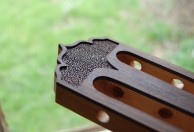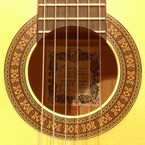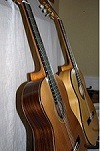Welcome to one of the most active flamenco sites on the Internet. Guests can read most posts but if you want to participate click here to register.
This site is dedicated to the memory of Paco de Lucía, Ron Mitchell, Guy Williams, Linda Elvira, Philip John Lee, Craig Eros, Ben Woods, David Serva and Tom Blackshear who went ahead of us.
We receive 12,200 visitors a month from 200 countries and 1.7 million page impressions a year. To advertise on this site please contact us.
|

|
|
RE: Guitar Longevity
|
You are logged in as Guest
|
|
Users viewing this topic: none
|
|
Login  | |
|

   
Exitao
Posts: 907
Joined: Mar. 13 2006
From: Vancouver, Canada

|
 RE: Guitar Longevity (in reply to a_arnold) RE: Guitar Longevity (in reply to a_arnold)
|
|
|
Hmmm... threadjacked. Was this where the tutorial was supposed to be? 
I am a bit curious about aged flamencos and if they are truly played out and what can be restored. If the soundboard has been too weakened because of too vigorous playing, I guess that's that. But how can a potential buyer know what to look for to know if there's any chance a good repair person can save it?
quote:
ORIGINAL: a_arnold
quote:
How come these changes are always POSITIVE?
Here's a theory: What if playing the guitar has nothing to do with it becoming "played in"? What if some makers sometimes use woods that aren't as well cured as they might be, and the drying out/seasoning process continues after the guitar is sold? So then the buyer notices change during the first few months while it dries out and adjusts to the buyer's home environment?
Here's another theory -- a testable one: Do people who live in dry environments (say, a northern climate in the winter) tend to report more improvement with time/playing while people who live (or keep the guitar) in humid environments notice less change?
Or: If a luthier in a dry environment ships to a buyer in a humid environment, is the buyer less likely to report improvement?
I bought a new Salvador Castillo from Paracho (which is notoriously humid) and play it in a relatively dry, humidity controlled house. It improved hugely. I also once bought a new Manuel de la Chica from a dry Mediterranean climate, and played it in the humid Washington DC environment -- didn't hear ANY improvement. It was a great guitar, but it didn't improve with time.
Maybe this is why there is so much variability in opinions on "playing in". Maybe it has nothing to do with playing the guitar and everything to do with humidity changes at the time of purchase.
Just a thought.
OK, here are some more thoughts:
If the wood was not sufficiently cured, I think that the odds are good that this would be bad for the guitar. However, there could be a difference between optimally cured and sufficiently cured for use.
I don't know, you could have a point.
The wood was supposed to be cured. But when the surface of the guitar is being finished, some moisture must penetrate the wood.
Once the exterior has hardened, the interior of the body has to wick what the wood absorbed. This could take time... can any luthier give a good guess how long?
And then there are the variables mentioned in the article Shroomy linked:
the effects of vibrations on the flexibility of the wood, the finish and even the glues.
It seems really hard to quantify some values and rule out confounds in any research applied to this subject.
Ron has a good point though when he asks "why are the changes always good?"
This question points to possible confounds. Is it not possible that as a person "breaks in a guitar" they are really just learning to get the best out of their guitar? (i.e. the guitar is breaking the player in?)
Just like people who try new strings and say they don't like the sound initially, but when they "settled in they sounded" good and now they are their favorite strings.
How much is simply the player being acclimatised to the sound? Do they still dislike the strings for the first few days every time they restring?
In psychology, they have something called the proximity effect, repeated exposure to a person can change your attitudes (eventual attraction to a person not initially your type, or even vice versa).
Could the same principle not also apply to guitars?
BTW: I'm not making any arguments, just asking questions. Which is the real point of research. Answer one question to get new questions to justify new research grants. :-P
I think the debating is great. Very educational. I just hope everyone can keep it up without getting angry.
_____________________________
Callidus et iracundus.
|
|
|
|
REPORT THIS POST AS INAPPROPRIATE |
Date May 14 2010 22:17:03
 |
|

   
Ricardo
Posts: 14806
Joined: Dec. 14 2004
From: Washington DC

|
 RE: Guitar Longevity (in reply to krichards) RE: Guitar Longevity (in reply to krichards)
|
|
|
quote:
ORIGINAL: krichards
quote:
Is it not possible that as a person "breaks in a guitar" they are really just learning to get the best out of their guitar?
I've made this point repeatedly but it seems its sacrilege to suggest it. It seems much more likely than any other factor to me.
While I admit that humidity, player's technique, even string brand or age can spoil the whole concept of a "test" or any science, the thing is I would tend to agree with YOUR point, had I not experienced the "breaking in phenomena" as an outside observer. Like you I would be skeptical with my OWN guitar and playing. Meaning, I saw guitars break in that were not mine, and the test was instant, I did not get a chance to change my playing with the guitars, or "get used to" the instruments in question.
I will say this again, anyone want to test this thing that doubts, simply give your instrument to a professional Rumbero or one that plays hard and everyday with a lot of energy and feeling and strong attack. After a few months get the guitar back, and regardless of your own technique abilities you will notice a change in your instrument....for the better.
But this assumes, once again, you don't have a major change in any of the 3 variables I first mentioned: significant humidity change, your personal playing changes drastically on its own in the intervening months, and you use the same strings brand and freshness as before the experiment.
Remember your guitar used to be part of a living thing, and is affected by how you treat it and it's environment, no matter how old or aged it is. Simple fact is guitars need to be PLAYED or they won't sound as good. And it doesn't matter if it is YOU playing it or someone else, so long as the playing is good intended and with good feeling.
Ricardo
_____________________________
CD's and transcriptions available here:
www.ricardomarlow.com
|
|
|
|
REPORT THIS POST AS INAPPROPRIATE |
Date May 15 2010 9:46:16
 |
|

   
Arash
Posts: 4495
Joined: Aug. 9 2006
From: Iran (living in Germany)

|
 RE: Guitar Longevity (in reply to Ricardo) RE: Guitar Longevity (in reply to Ricardo)
|
|
|
quote:
ORIGINAL: Ricardo
I will say this again, anyone want to test this thing that doubts, simply give your instrument to a professional Rumbero or one that plays hard and everyday with a lot of energy and feeling and strong attack. After a few months get the guitar back, and regardless of your own technique abilities you will notice a change in your instrument....for the better.
where to find a pro. rumbero , who will play my guitar daily , just for me to "break it in" ? 
this could be a good business idea for rumberos:
guitar breaking in service:
10 days - free trial
3 months - 100 hours of hard playing - 300 dollars
6 months - 200 hours of hard playing - 500 dollars
with money back guaranty
if your guitar doesn't break in, you get your money back

---
joking aside, i don't know how significantly the change is ( i can only say that i have recognised a small change on my guitar , but this for sure), but anyway i bought a japanese flamenco factory guitar from a rumbero very cheap last year (it had also an ugly white golpeador) and many scratches. But this guy used to play this guitar regurarly and HEAVILY. All i can say is that i don't think that this guitar (when it was New) sounded anywhere near what it sounded, when i bought it. I bet what you said happened to this guitar.
_____________________________
|
|
|
|
REPORT THIS POST AS INAPPROPRIATE |
Date May 15 2010 10:41:13
 |
|
 New Messages New Messages |
 No New Messages No New Messages |
 Hot Topic w/ New Messages Hot Topic w/ New Messages |
 Hot Topic w/o New Messages Hot Topic w/o New Messages |
 Locked w/ New Messages Locked w/ New Messages |
 Locked w/o New Messages Locked w/o New Messages |
|
 Post New Thread
Post New Thread
 Reply to Message
Reply to Message
 Post New Poll
Post New Poll
 Submit Vote
Submit Vote
 Delete My Own Post
Delete My Own Post
 Delete My Own Thread
Delete My Own Thread
 Rate Posts
Rate Posts
|
|
|
Forum Software powered by ASP Playground Advanced Edition 2.0.5
Copyright © 2000 - 2003 ASPPlayground.NET |
0.078125 secs.
|


 Printable Version
Printable Version


















 New Messages
New Messages No New Messages
No New Messages Hot Topic w/ New Messages
Hot Topic w/ New Messages Hot Topic w/o New Messages
Hot Topic w/o New Messages Locked w/ New Messages
Locked w/ New Messages Locked w/o New Messages
Locked w/o New Messages Post New Thread
Post New Thread